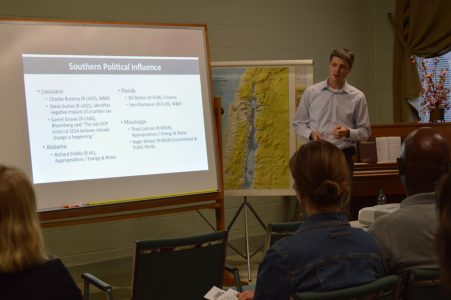Post contributed by Kyle G. Crider, Energy Project Manager, Alabama Environmental Council and the Alabama Solar Knowledge Project

Citizens gather to learn more about how to advocate for solutions to climate change.
Last night, I was one of more than 40 diverse folks of all ages, ethnicities, and religious backgrounds who attended an interfaith event at Birmingham’s First United Methodist Church to discuss hope in the face of perilous climate change. Last night’s event was one of 22 such stops on the Southern Energy Freedom Tour, presented by Citizens Climate Lobby (CCL).
Earlier in the day, CCL representative Peter Bryn – a former ExxonMobil engineer and CCL’s Conservative Outreach Coordinator, met with key local decisionmakers to share CCL’s market-based solution for not only lowering dangerous greenhouse gas (GHG) emissions, but adding jobs, stimulating the economy, and even saving lives by avoiding the many negative health effects also associated with burning fossil fuels.
CCL’s solution involves putting a price on carbon so that markets can work with the efficiency for which they are famed – specifically, via a fee-and-dividend policy. Fee-and-dividend has a number of advantages over another price on carbon that is sometimes proposed: A carbon tax. The main problem with a carbon tax is that it is regressive, i.e., it affects lower-income Americans disproportionately. A carbon tax also suffers greatly from the fact that it is a tax, and many Congressional Republicans have signed a pledge to not introduce any new taxes.
Unlike a tax, which is collected by and used by government, CCL’s fee-and-dividend climate change solution would go into a trust fund and – every month – funds collected would be disbursed equally to all Americans. While the price on carbon would raise the cost of fossil fuels, it would also send a clear signal to fossil fuel producers to seek cleaner, safer, cheaper energy solutions. How would these higher fossil fuel prices affect citizens? CCL reports that based on economic analyses of the dividend disbursement, “About two-thirds of households will break even or receive more than they would pay in higher prices. This feature will inject billions into the economy, protect family budgets, free households to make independent choices about their energy usage, spur innovation and build aggregate demand for low-carbon products at the consumer level.”
If you are interested in learning more about CCL and their market-based solution that could result in a monthly dividend check, I encourage you to watch this brief video and then consider one of the many ways you can Take Action with CCL, from writing a letter to the editor of your local news to forming a local chapter.
Kyle G. Crider is Energy Project Manager for the Alabama Environmental Council and the Alabama Solar Knowledge project. Kyle holds a bachelor’s degree in Environmental Studies and a Master of Public Administration (MPA) degree with a double-emphasis in Urban Planning & Policy Analysis. He is a Leadership in Energy and Environmental Design Accredited Professional, Neighborhood Development (LEED AP ND).




